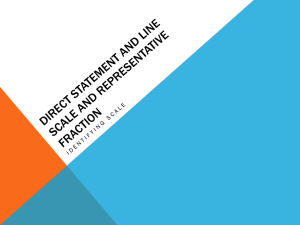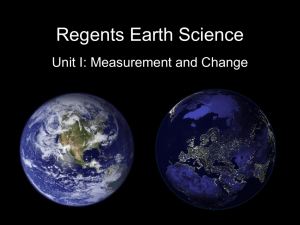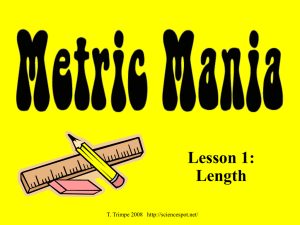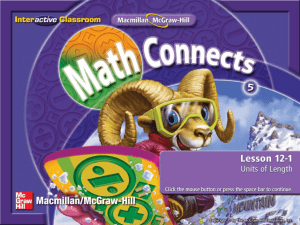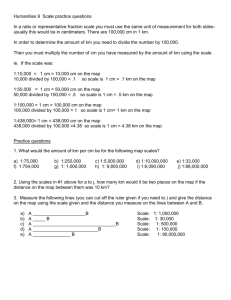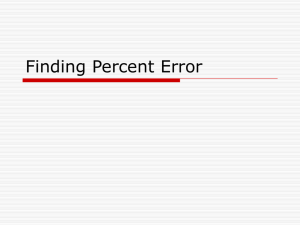Metric Measurement
advertisement
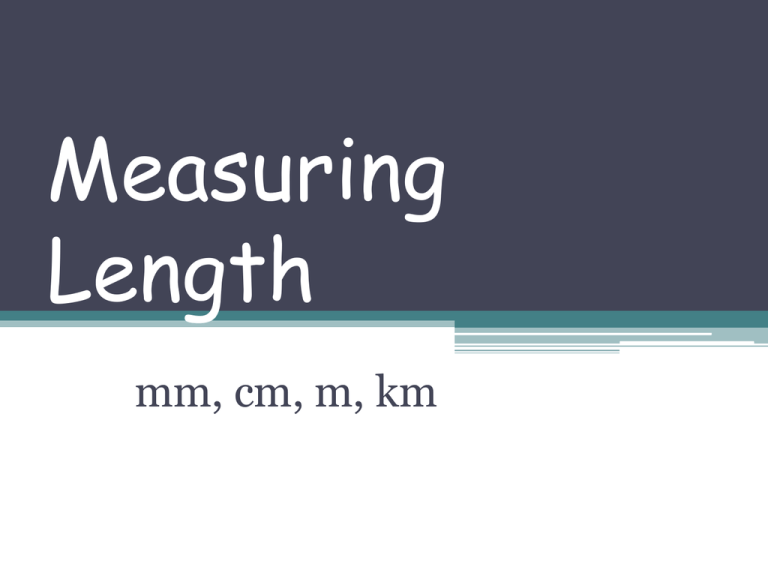
Measuring Length mm, cm, m, km Set up your yellow paper • Fold on the dotted lines and Cut on the solid lines (be sure to cut out the top right so “units” shows) • Label the left three flaps in this order: ▫ Length ▫ Basic Unit ▫ Tools • Label the right four flaps in this order ▫ mm ▫ cm ▫m ▫ km What is Length **Write these under the flaps** Length: The distance between two points Basic Unit: The basic unit of measurement for length and distance is the meter (m). Tools: When measuring length we use meter sticks (m and cm) and metric rulers (cm and mm). mm, cm, m, and km • Meters (the basic unit of length and distance) can be broken down into smaller parts. • These smaller parts are centimeters (cm) and millimeters (mm) • Let’s start with centimeters (cm)… Centimeters (cm) are used to measure small objects. This is a centimeter (cm). A centimeter (cm) is about the same size as one m&m. Write this under the cm flap: • • • • cm= centimeter These are small 1 regular m&m candy = 1cm 100cm = 1 meter Write this on the back of the cm flap: • *used to measure: ▫ A desk ▫ A shoe ▫ A book ▫ A pencil We put several centimeters (cm) together to make a metric ruler. Like This 1 2 3 4 5 6 7 8 9 10 11 12 13 14 15 16 17 18 19 20 21 22 23 24 25 26 27 28 29 Look at the ruler on your desk. Find the side with centimeters (cm). This is what a metric ruler looks like! Now, we can use this metric ruler to measure larger objects like pencils, books, and keyboards. 1 2 3 4 5 6 7 8 9 10 11 12 13 14 15 16 17 18 19 20 21 22 23 24 25 26 27 28 29 How to Use a Metric Ruler: Looking at the ruler on your desk. Look for the line farthest to the left. This is the Zero (0) line. Line up the edge of the object you are measuring with the Zero line. Then find the number that matches with the other end of the object. This is the length of the object in centimeters (cm). Zero Line Lines up with 6 so the crayon is 6 cm long. 1 2 3 4 5 6 7 8 9 10 11 12 13 14 15 16 17 18 19 20 21 22 23 24 25 26 27 28 29 How long is this pencil? 1 2 3 4 5 6 7 8 9 10 11 12 13 14 15 16 17 18 19 20 21 22 23 24 25 26 27 28 29 Did you say 7 centimeters (cm)? How long is this keyboard? 1 2 3 4 5 6 7 8 9 10 11 12 13 14 15 16 17 18 19 20 21 22 23 24 25 26 27 28 29 Did you say 22 centimeters (cm)? 9 10 11 12 13 14 15 16 17 18 19 20 21 7 8 3 4 5 6 1 2 How tall is this stack of books? Did you say 12 or 13 centimeters (cm)? What if we wanted to measure really small things? If you look very closely at a centimeter, you’ll see it’s divided up into ten tiny parts. Let’s make it bigger to see these little parts. Each one of these tiny parts is called a millimeter. 1 2 3 4 5 6 7 8 9 10 There are 10 millimeters in every centimeter. Write this under the mm flap: milimeters (mm) are very, very tiny. Mm=milimeter The thickness of about 9 sheets of notebook paper is equal to 1 milimeter (mm) There are 10mm in every centimeter (cm). Write this on the back of the mm flap: *used to measure • eraser tips, • fingernails, • eye lashes. What about larger objects? When we need to measure larger items, we need to put a lot of centimeters (cm) together. Instead of using lots of centimeters (cm) we measure using meters (m). To make a meter (m) we need 100 centimeters (cm). 1 2 3 4 5 6 7 8 9 10 11 12 13 14 15 16 17 18 19 20 21 22 23 24 25 26 27 28 29 The metric ruler on your desk is little more than 30 centimeters (cm), so we’d need a little more than 3 of these to make a meter Use the metric rulers on your desk and lay them end to end. Take the meter stick and lay it next to the metric rulers. How many metric rulers did it take to make a meter stick? 1 2 3 4 5 6 7 8 9 10 11 12 13 14 15 16 17 18 19 20 21 22 23 24 25 26 27 28 29 Meters are used to measure things like tables, rooms, and hallways. Put this under your m flap • m = meter ▫ These are larger • You sitting in a chair is about 1m tall • 1,000 m = 1 kilometer Put this on the back of your m flap *Used to measure: • A room • A hallway • The length of a car What if you want to measure distances between places that are far apart like Corona and Disney World? That’s a LONG distance! It would take a LONG TIME to do it with a meter stick, wouldn’t it? To measure long distances with metrics we use kilometers. To make a kilometer, it takes 1,000 meters. 1 2 3 4 5 6 7 8 9 10 11 12 13 14 15 16 17 18 19 20 21 22 23 24 25 26 27 28 29 31 32 33 34 35 36 37 38 39 40 41 42 43 44 45 46 47 48 49 50 51 52 53 54 55 56 57 58 59 61 62 63 64 65 66 67 68 69 70 71 72 73 74 75 76 77 78 79 80 81 82 83 84 85 86 87 88 89 91 92 93 94 95 96 97 98 99 1 2 3 4 5 6 7 8 1,000 of these end to end would make 1 kilometer. 9 10 11 12 13 14 15 16 17 18 19 20 21 22 23 24 25 26 27 28 29 31 32 33 34 35 36 37 38 39 40 41 42 43 44 45 46 47 48 49 50 51 52 53 54 55 56 57 58 59 61 62 63 64 65 66 67 68 69 70 71 72 73 74 75 76 77 78 79 80 81 82 83 84 85 86 87 88 89 91 92 93 94 95 96 97 98 99 The family car is a great place to see kilometers. Chris Cuppett – Wicomico County, Maryland If you look at the speed dial in the car, you’ll see that the speed of the car can be seen in two ways, miles per hour (MPH) and kilometers per hour (km/h). Put this under your km flap • km = kilometer ▫ These are largest • From CHIS to Pick up Stix next to Albertsons is about 1km Put this on the back of your km flap *Used to measure: • Very far distances ▫ Corona to Disney World in Florida ▫ Corona to New York When we write numbers in metrics, we usually don’t write out the whole word. There are shorter names for each unit of measurement. Metric Abbreviations •Millimeter – mm Pretty •Centimeter – cm easy to •Meter – m remember, •Kilometer - km right? Let’s review: To measure very small objects and distances, what do we use? To measure objects like pencils, what do we use? To measure objects like rooms or hallways, what do we use? To measure long distances like from here to Disney World, what do we use?
